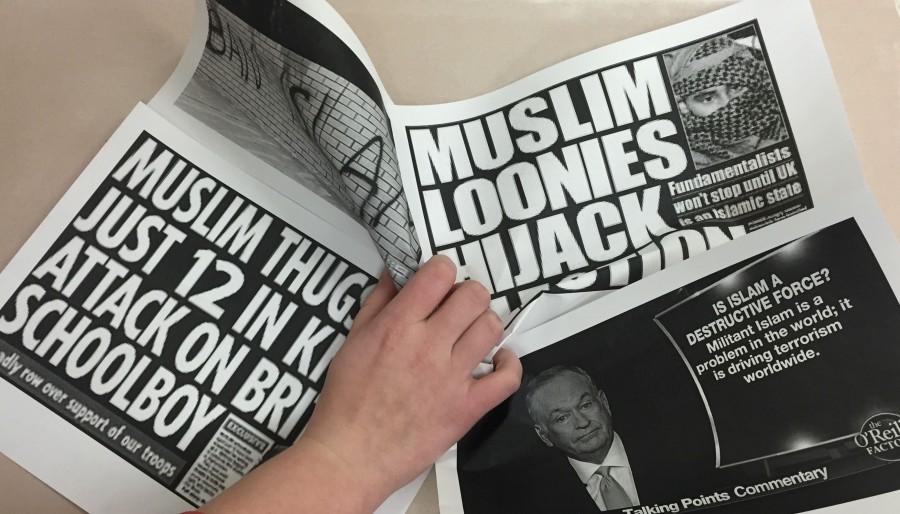Amidst Islamophobia, Muslims find CHS welcoming
Since the terrorist attacks on Charlie Hebdo in Paris Jan. 7, instances of Islamophobia have been on the rise around the world.
February 24, 2015
In light of the recent attacks at the Charlie Hebdo headquarters in Paris, the world’s attitudes toward the Muslim faith is again in the spotlight.
Each time a Muslim is involved in a bombing or another type of tragedy in the world, the religion as a whole is often stereotyped as a group of terrorists. The same can be said about other racial groups such as African Americans and Latinos, but when a white person is at the helm of a tragic event, it is usually referred to as an isolated incident and not representative of the people as a whole. Overall, America’s case of Islamophobia, the prejudice or hatred against Muslims, has gotten worse. According to the Arab American Institute, American approval of Muslims has dropped from 35 percent to 27 percent between 2010 and 2014.
“The terrorists who are performing these actions are not Muslim,” said freshman Mariam Hashem, who identifies as a Muslim. “They do not belong to any religion because they go against every word in the Quran. Some people do not realize that and are ignorant towards all Muslims and some actually get paranoid if they see one in an airport.”
It is not uncommon to log onto a popular news site and see more headlines that place Muslims in a negative light than headlines that celebrate the heritage.
“I think it’s because the U.S. media is very unfamiliar with the Middle East and the religion,” said senior Zeshawn Manzoor, whose family is from Pakistan and who identifies as Muslim. “Since they have a few bad apples, they tend to blame the orchard.”
Some believe that the media likes to zero in on the problems surrounding Islam and ignores all the positive aspects of the culture.
“There are many Muslims doing amazing things yet you never see that on the news,” Hashem said. “You only see the bad news that portrays us as harmful.”
One of the most common examples of American prejudice is in airports. Many men and women feel like they are profiled for how they look and their religious association.
“I’ve been asked before if any of my family members are terrorists,” Hashem said. “In an American airport I was once sent to another room where all the women wearing were hijabs, and I’m still not sure why I was sent there, but members of my family have been flagged because of their name or place of birth.”
While the anti-Muslim stigma is rather common in public and the media, CHS has been lauded for its welcoming attitude towards its diverse array of ethnicities and religious backgrounds.
“I think we are really lucky to have students of different faiths and backgrounds,” assistant principal John Taylor said. “We have a lot more diversity than people think.”
While CHS does not supply information on the religious backgrounds of its students, according to the Winston Churchill High School Profile, which gives a synopsis of the school’s racial identities, 55.6 percent of the students identify as white, 23.2 percent as Asian, 8.5 percent black, 8.4 percent Hispanic, 4.2 percent multi-racial, and .1 percent Native American.
“We have not had any cases in recent memory of a student being bullied because of an outside incident in the news,” Taylor said.
On the flipside of the issue, sophomore Katie Teague, who has lived in several Middle Eastern countries but does not identify as Muslim, notices a difference in attitude of the citizens in the Middle East than those attitudes of Americans.
“America is kind of like a bubble,” Teague said. “There is some bias and people exaggerate, but people need to look from all different perspectives.”
But this bubble was eventually popped when Teague returned home to America and enrolled at CHS. Despite hearing the generalizations about CHS’ white, privileged population, Teague noticed the school’s personality that goes below the surface.
“I was told about all the Churchill stereotypes and I was surprised,” Teague said. “There is such a wide diversity of people and they are generally accepting.”
Even though it is a growing demographic in MCPS schools, Muslim students and families are upset with the recent decision not to recognize the major Muslim holidays by cancelling school.
According to Taylor, the population of Muslim students is not sufficient enough to cause attendance problems in schools, which was a deciding factor in the county’s decision.
Nevertheless, students are optimistic about the welcoming environment established in the CHS community.
Hashem, Manzoor, and Teague all agreed that CHS has been a welcoming place to them since they started school here.
“Churchill is very accepting for people to be whatever they want to be,” Teague said. “I feel like I fit in here.”


